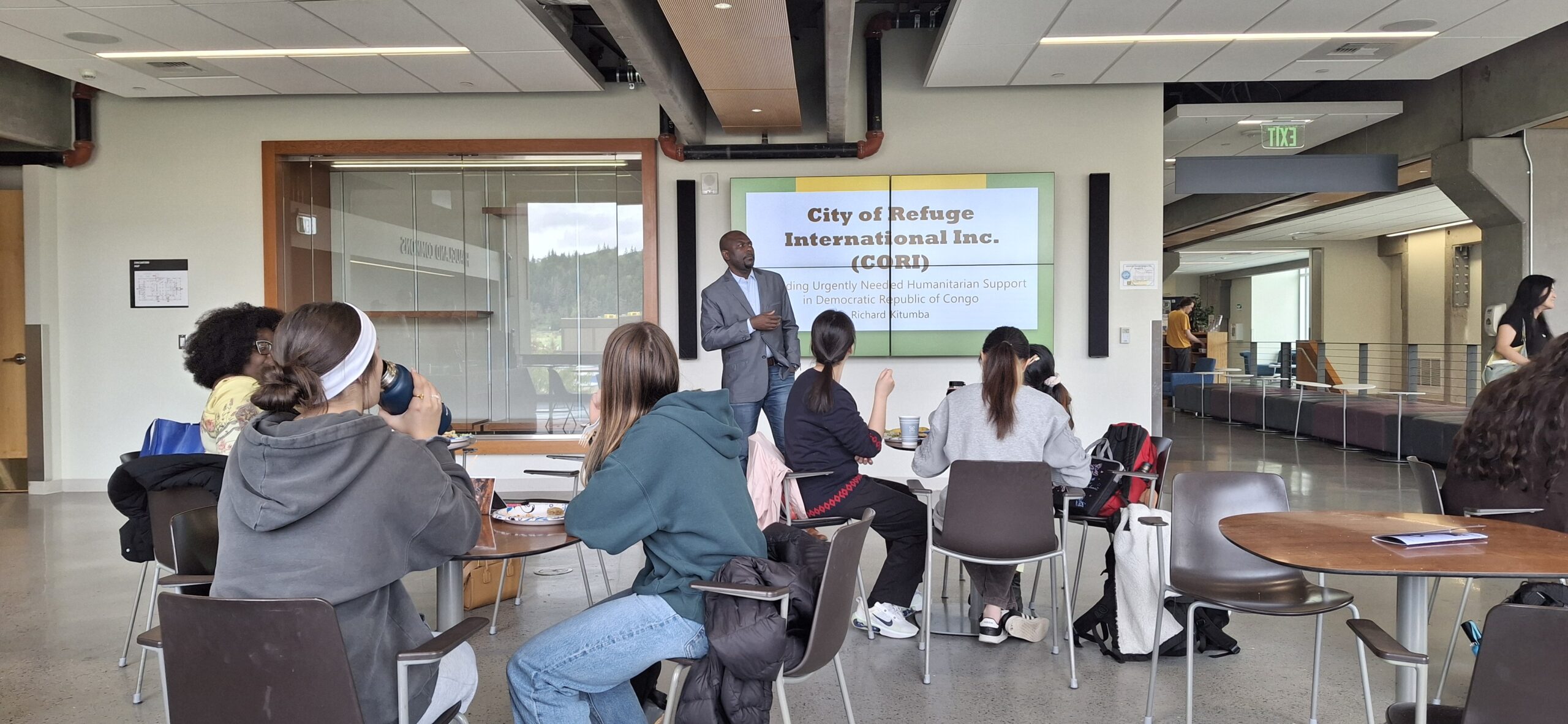The diverse turn out of local residents and other supporting humanitarian and advocacy groups for the Feb. 19 Eugene’s Martin Luther King Jr. celebration and march demonstrates still a belief and need of Dr. King’s dream being realized. The march, which started at Autzen Stadium, was held and hosted by the Eugene-Springfield NAACP (National Association for the Advancement of Colored People).
The celebration and march was a mixture of the past and present, of hope and reality, and from commemorations of the Kalapuya people and their dislocation, the legacy of Oregon’s exclusionary laws on inclusion and retention in Eugene, to local senior, Jeyla Luvert, 17, of Bridge Charter Academy dual enrolled at LCC (Lane Community College), receiving an award in recognition of Teen Community Service. The event concluded with a Q & A session with city and county officials, Jennifer Yeh, Eugene City Councilor Ward 4, Rick Hamilton, Eugene School District 4J Board member, Pat Farr, Commissioner District 4 North Eugene and Chief Chris Skinner, Eugene Police Department.
The march began at Autzen Stadium and ended at the John G. Shedd Institute For The Arts, the marchers included representatives from HONEY (Honoring Our New Ethnic Youth) Inc., Moms Demand Action,Black Cultural Initiative, St. Mark’s Christian Methodist Episcopal Church, Unitarian Universalist Church in Eugene, Church Women United of Lane County and Community Rights Lane County.
Those gathered remembered King’s “Dream” and acknowledged that civil rights is still a timely and ongoing process, and also under different banners and organizations. “We look around at each other, we think about that movement and how it took different people from different backgrounds to be a part of that to drive that,” said Demond Hawkins, who is currently serving as the president of the Eugene Springfield NAACP, “We make a difference on what we do by not staying silent and being a part of this you’re making a difference.”
Among the marchers were those who’ve stayed aware of the need to fulfill King’s legacy, Dr. Rosa Colquitt, state party chair for the Democratic Party of Oregon, and vice president NAACP, Portland branch said, “Dr. King’s nonviolent approach to form social and racial change shaped my life.”
DeAngelo Moaning, first vice president NAACP, Economic Development, Portland branch said, “The march is a powerful message of inclusion.”
The march’s route led through Alton Baker Park, in recognition of the historical significance of the park’s existence. A walk through Nobel Peace Park highlighted the achievements of Ralph Bunche, was a political scientist, diplomat who participated in the mediation of Israel, in the late 1940s, receiving the Nobel Peace Prize in 1950.William Arthur Lewis, was a Saint Lucian economist and the James Madison Professor of Political Economy at Princeton University awarded the Nobel Memorial Prize in Economic Sciences In 1979 and Barack Obama, and past the historically significant site of the Mims house.
The march through Eugene had different meanings for marchers,“It’s an opportunity to pause and to remember the walk through the Nobel Peace Park is a reminder to keep moving forward with expediency” said Lisa Cronch, a member of Unitarian Universalist Church in Eugene. While smiling Charles Durham, a local resident of Eugene for 25 years, said, “Today is a good day to be on a march.”
Talicia Brown, founder and executive director of Black Cultural Initiative said, “It’s beautiful to see so many people come together to remember Dr. King’s contributions.”
Due to the ice storm and rescheduling, the turn out had been reduced this year. Although a nationally celebrated President’s Day, Eugene’s 4J district children had to attend school. “It’s good to point out the importance of Black History within the community, however, the turn out was less due to school being in session,” said Dr. Lawrence Rasheed, African American Student Program coordinator at LCC.
Eugene mayoral candidate Kaarin Knudson said,”I’m always ready to show support for racial equality and the NAACP and causes that bring people together. Although the march had been postponed I’m grateful to be a part of this.”
For Diane Peterson, Moms Demand Action, “There’s still so much work to do for civil rights.” The multiple organizations and the diversity of the marchers only underscored the need still for “civil disobedience” in the pursuit of civil and human rights.The issues raised at the question and answer session with both city and county officials focused on inclusion and retention of African Americans in the Eugene-Springfield areas and strategies to support and address these problems, related to racial/class disparities in Eugene and statewide with acknowledgment of the repercussions of an era’s previous laws and attitudes. The resolution was to investigate and promote awareness and acknowledgment that a subtle dislocation of certain groups of people is a very real and still an ongoing problem in Eugene. King advocated and supported civil rights, however, his topics revolved around social, financial, educational and judicial disparities as well. While it’s been 61 years since his Letter from Birmingham Jail, marchers are still hoping for change. As King wrote from his cell,“For years now I have heard the word ‘wait.’… “Is justice delayed, justice denied?”

